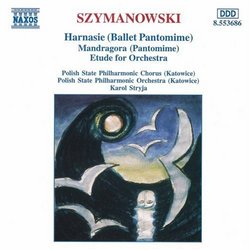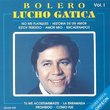| All Artists: Karol Szymanowski, Karol Stryja, Polish Chamber Philharmonic, Grzegorz Fitelberg, Henryk Grychnik, Stanislaw Meus Title: Szymanowski: Harnasie (Ballet Pantomime) Op.55/Mandragora (Patomime), Op. 43/Etude For Orchestra In B Members Wishing: 1 Total Copies: 0 Label: Naxos Original Release Date: 1/1/1997 Re-Release Date: 3/18/1997 Genre: Classical Styles: Ballets & Dances, Ballets, Forms & Genres, Etudes, Historical Periods, Modern, 20th, & 21st Century, Symphonies Number of Discs: 1 SwapaCD Credits: 1 UPC: 730099468626 |
Search - Karol Szymanowski, Karol Stryja, Polish Chamber Philharmonic :: Szymanowski: Harnasie (Ballet Pantomime) Op.55/Mandragora (Patomime), Op. 43/Etude For Orchestra In B
 | Karol Szymanowski, Karol Stryja, Polish Chamber Philharmonic Szymanowski: Harnasie (Ballet Pantomime) Op.55/Mandragora (Patomime), Op. 43/Etude For Orchestra In B Genre: Classical
Harnasie is a choral ballet with folk inspired songs and dances that can perhaps be best compared to Stravinsky's Les Noce (The Wedding). It has a similar enlivening sense of rhythm and some really fresh and appealing t... more » |
Larger Image |

 Track Listings (4) - Disc #1
Track Listings (4) - Disc #1